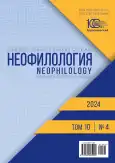The image of COVID-19 in the Russian linguistic consciousness
- Authors: Deryabina S.A.1, Dyakova T.A.2, Mitrofanova I.I.1
-
Affiliations:
- Peoples’ Friendship University of Russia
- Derzhavin Tambov State University
- Issue: Vol 10, No 4 (2024)
- Pages: 789-799
- Section: RUSSIAN LANGUAGE. LANGUAGES OF PEOPLES OF RUSSIA
- URL: https://journal-vniispk.ru/2587-6953/article/view/295619
- DOI: https://doi.org/10.20310/2587-6953-2024-10-4-789-799
- ID: 295619
Cite item
Full Text
Abstract
INTRODUCTION. The widespread spread of COVID-19 in Russia could not but affect the Russian linguistic consciousness, in which the associative thesaurus of the 21st century pandemic is being formed to one degree or another. Russian-language information resources are full of information about the new virus and the need for vaccination against it. These topics are actively discussed by the entire Russian-speaking population. The aim is to explore the image of COVID-19 in the Russian linguistic consciousness in the aspect of syntagmatic, paradigmatic and thematic associative thesaurus in two time periods: May–June 2020 and May–June 2021.MATERIALS AND METHODS. The research material is the National Russian Language Corps, social network’s hashtags, printed and electronic content « Rossiyskaya Gazeta and RBC newspapers. The associative experiment method is used to identify syntagmatic and paradigmatic reactions and thematic groups.RESULTS AND DISCUSSION. The analysis is an attempt to demonstrate the formation state of the concept of COVID-19 in the linguistic consciousness of Russians. The subject of the study was the syntactic function of the COVID-19 lexeme and the results of an associative experiment.CONCLUSION. The syntactic function of the COVID-19 lexeme, its lexical compatibility and connotation have been identified. It has been established that the perception of the COVID-19 epidemic in the linguistic consciousness is assessed as a typical characteristic of modernity and is recognized as part of reality along with the problems of global changes in ecology and climate and exists along with such concepts as globalization, digitalization and convergence.
About the authors
S. A. Deryabina
Peoples’ Friendship University of Russia
Email: deryabina-sa@rudn.ru
ORCID iD: 0000-0002-5415-5433
Cand. Sci. (Education), Associate Professor, Associate Professor of Russian Language and Methods of its Teaching Department
6 Miklouho-Maklaya St., Moscow, 117198, Russian FederationT. A. Dyakova
Derzhavin Tambov State University
Email: Larionova86@mail.ru
ORCID iD: 0000-0003-1032-5573
Cand. Sci. (Education), Associate Professor, Head of Russian Language Department
33 Internatsionalnaya St., Tambov, 392000, Russian FederationI. I. Mitrofanova
Peoples’ Friendship University of Russia
Author for correspondence.
Email: mitrofanova_ii@rudn.ru
ORCID iD: 0000-0003-0532-8841
Cand. Sci. (Sociology), Associate Professor, Associate Professor of Russian Language and Methodology Teaching Department
33 Internatsionalnaya St., Tambov, 392000, Russian FederationReferences
- Losev A.F. Existence. Name. Space. Moscow, Mysl’ Publ., 1993. 958 p. (In Russ.) https://elibrary.ru/tjcsyr
- Mamontov A.S. The history of the linguistic and cultural direction formation and development in linguistics. Osnovy teorii i praktiki obucheniya yazyku kak sredstvu mezhkul’turnoi kommunikatsii s uchetom natsional’noi kul’tury adresata = Theory and practice fundamentals of language teaching as a means of intercultural communication, taking into account the national culture of the addressee. Moscow, RIOR Publ., 2023. 230 p. (In Russ.) https://doi.org/10.29039/02121-7
- Ufimtseva N.F., Balyasnikova O.V. Language picture of the world and associative lexicography. Vestnik Volgo-gradskogo gosudarstvennogo universiteta. Seriya 2: Yazykoznanie = Science Journal of Volgograd State Uni-versity. Linguistics, 2019, vol. 18, no. 1, pp. 6-22. (In Russ.) https://doi.org/10.15688/jvolsu2.2019.1.1, https://elibrary.ru/tgfeun
- Novikova O.N., Kalugina Yu.V. The color metaphor of the Сoronavirus. Neofilologiya = Neophilology, 2024, vol. 10, no. 1, pp. 8-16. (In Russ.) https://doi.org/10.20310/2587-6953-2024-10-1-8-16, https://elibrary.ru/aklamf
- Novikova O.N., Kalugina Yu.V. Zoometaphor as a way of perceiving the new Coronavirus infection COVID-19. Neofilologiya = Neophilology, 2023, vol. 9, no. 1, pp. 43-53. (In Russ.) https://doi.org/10.20310/2587-6953-2023-9-1-43-53, https://elibrary.ru/ferhxu
- Katermina V.V., Lipiridi S.Kh. Vocabulary of the Coronavirus pandemic as a reflection of the evolution of so-ciety. Aktual’nye problemy filologii i pedagogicheskoi lingvistiki = Current Issues in Philology and Pe-dagogical Linguistics, 2022, no. 1, pp. 95-105. (In Russ.) https://doi.org/10.29025/2079-6021-2022-1-95-105, https://elibrary.ru/lewqll
- Dankova N.S., Krekhtunova E.V. Media representation of the pandemic: a metaphorical image of war (based on American newspapers). Nauchnyi dialog = Scientific Dialogue, 2020, no. 1 (8), pp. 69-83. (In Russ.) https://doi.org/10.24224/2227-1295-2020-8-69-83, https://elibrary.ru/rqcqag
- Novikova O.N., Kalugina Yu.V. Coronavirus metaphor in political discourse and individual consciousness. Doklady Bashkirskogo universiteta, 2022, vol. 7, no. 5, pp. 270-278. (In Russ.) https://doi.org/10.33184/dokbsu-2022.5.4, https://elibrary.ru/nmvvhc
- Shcherbak A.S. An onomastic concept as a knowledge unit. In: Cognitive Studies of Language. Vol. IV. World Conceptuali zation in Language. Moscow, Institute of Linguistics of RAS; Tambov, Publishing House of DerzhavinTambov State University, 2009, pр. 150-165. (In Russ.) https://elibrary.ru/mwdgyr
- Sharandin A.L. Consciousness, semiotics, language, communication and pragmatics as a common conceptual space. Voprosy psikholingvistiki = Journal of Psycholinguistics, 2015, no. 25, pp. 240-250. (In Russ.) https://elibrary.ru/udlhjt
- Zolotova G.A. Functions and dysfunctions in modern Russian speech. Sbotnik statei «Russkii yazyk segodnya» = Collection of Articles “Russian Language Today”, Moscow, Azbukovnik Publ., 2000, issue 1, 596 p. (In Russ.)
- Karasik V.I. Epidemic in the mirror of media discourse: facts, evaluations, positions. Politicheskaya lingvistika = Political Linguistics, 2020, no. 2 (80), pp. 25-34. (In Russ.) https://doi.org/10.26170/pl20-02-02, https://elibrary.ru/cvtkmt
- Kavinkina I.V. The Gender Manifestation in the Speech Behavior of the Russian Language Native Speakers. Gender Stereotypes’ Analysis in Communication. Saarbrucken, LAP LAMBERT Academic Publ., 2012, 117 p. (In Russ.)
- Zalevskaya A.A. Iz opyta sopostavleniya assotsiativnykh reaktsii iz opyta razlichnykh kul'tur. In: Psikholingvistika i obuchenie russkomu yazyku nerusskikh. Moscow, Russkii yazyk, 1977, рр. 158-169.
- Zalesskaya N.A. The linguistic picture of the world of social network users (using the example of the Facebook site). Sbornik statei mezhdunarodnoi nauchno-prakticheskoi konfetentsii «Kartina mira cherez prizmu kitaiskoi i belorusskoi kul’tur» = Proceedings of International Scientific and Practical Conference “A Picture of The World through The Prism of Chinese and Belarusian Cultures”. Minsk, Belarus State Economic University Publ., 2019, pp. 51-55. (In Russ.) https://elibrary.ru/zvqhcd
Supplementary files









